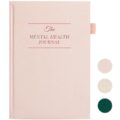Taking care of your mental health is essential in today’s world. Stress, anxiety, and life’s constant demands make mental health self-care more than just a choice—it’s a necessity. But what does self-care look like for your mental health, and how can you make it work in your daily life?
Also Read
In this post, we’ll explore simple, effective strategies to boost emotional well-being. You’ll learn how to use practical tips, explore innovative tools, and adopt habits that can make a lasting impact. Whether it’s through mindfulness, physical activity, or staying connected, this guide is designed to give you real, actionable advice.
With the right steps, you can take control of your mental wellness and build a stronger, more balanced life. Let’s explore what self-care means and how you can make it part of your everyday routine.
Why Mental Health Self-Care Matters

The Foundation of Emotional Well-Being
Taking time for yourself isn’t selfish—it’s necessary. Self-care builds the foundation for managing stress, improving mental clarity, and staying emotionally balanced. When you prioritize your mental health, you set the stage for a more productive, fulfilling life. Studies show that individuals who practice regular self-care strategies experience reduced anxiety and improved emotional stability.
The Stress Epidemic
The American Psychological Association reports that over 70% of adults experience stress daily. Without mental health self-care, stress can lead to serious consequences, including burnout and chronic health issues. Simple practices like mindfulness and exercise are proven to lower cortisol levels, which reduces the physical toll of stress on your body.
Benefits Beyond the Individual
Your self-care routine doesn’t just help you; it benefits those around you. A calmer, more focused you can build stronger relationships, contribute positively to your community, and inspire others to focus on their mental wellness. By making time for self-care, you create a ripple effect that spreads positivity.
Self-Care Strategies in Action
- Mindfulness Practices: Start with five minutes of daily meditation to center your thoughts.
- Physical Activity: Try light stretching or a short walk to release endorphins.
- Healthy Boundaries: Learn to say no when overwhelmed, protecting your energy.
| Action | Impact on Mental Health |
|---|---|
| Meditation | Reduces stress and increases focus |
| Journaling | Promotes self-reflection |
| Connecting with Nature | Boosts mood and reduces anxiety |
Affiliate Links for Support
Explore tools and resources to support your journey:
Effective Self-Care Strategies

Simple Steps for Mental Wellness
Mindfulness as a Cornerstone
Creating a self-care routine doesn’t need to be complicated. Start small, focusing on activities that are easy to integrate into your daily life. The goal is consistency over perfection. Whether it’s journaling, meditating, or connecting with friends, these habits can strengthen your emotional resilience.
Mindfulness is one of the most effective mental health self-care practices. Spend just five minutes focusing on your breath each morning to create a sense of calm. Apps like Headspace and Calm offer guided meditations that fit busy schedules.
| Mindfulness Tips | Time Commitment | Benefit |
|---|---|---|
| Deep breathing exercises | 5 minutes | Reduces anxiety |
| Gratitude journaling | 10 minutes | Improves mental outlook |
| Guided meditations | 10–20 minutes | Enhances emotional clarity |
Physical Activity for Mental Health
Staying active is a natural stress reliever. Activities like walking, yoga, or light stretching release endorphins, improving mood and energy levels. Research from the National Institute of Mental Health confirms that even moderate exercise reduces symptoms of depression and anxiety.
- Walking: 20 minutes daily can significantly boost your mood.
- Yoga: Combines physical movement with mindfulness, promoting relaxation.
- Stretching: Keeps your body flexible while reducing physical tension.
Nourish Your Body and Mind
A healthy diet supports emotional well-being. Incorporate whole foods like fruits, vegetables, and lean proteins into your meals. Limit processed snacks and sugar, as they can negatively impact your mood. Hydration is equally important; aim for at least eight glasses of water daily.
Practical Tools to Help You Start
- Self-Care Journals for daily reflection and tracking.
- Mindfulness Apps to guide your practice.
- Affordable Exercise Gear to keep you moving.
Taking small, intentional steps every day builds a foundation for long-term mental wellness. Would you like me to continue with the next section, or refine this one further?
The Role of Technology in Mental Health Self-Care

Modern Tools for Mental Wellness
Technology has revolutionized how we approach mental health self-care. From apps to wearable devices, digital solutions make it easier than ever to stay mindful and track progress. These tools offer convenience and accessibility, empowering users to prioritize their emotional well-being on the go.
Top Mental Health Apps
- Headspace: Provides guided meditations, breathing exercises, and sleep aids.
- Woebot: An AI-driven chatbot that offers emotional support and self-help guidance.
- Calm: Focuses on relaxation with features like sleep stories and stress reduction exercises.
These apps are designed to cater to various needs, ensuring there’s something for everyone.
| App | Best Feature | Cost |
|---|---|---|
| Headspace | Guided meditations | Free/Paid options |
| Woebot | AI-driven emotional support | Free |
| Calm | Relaxation and sleep aids | Free/Paid options |
The Rise of Wearables
Wearable devices like smartwatches and fitness trackers monitor physical activity, sleep patterns, and even stress levels. These insights help users make informed decisions about their mental and physical health. For instance, Fitbit and Apple Watch now include stress management features, encouraging regular mindfulness breaks.
Virtual Reality (VR) Therapy
Virtual reality is transforming therapy by creating immersive environments for stress relief. VR platforms like Limbix offer interactive experiences to manage anxiety, phobias, and PTSD. This cutting-edge technology is becoming a valuable addition to mental health care.
Enhance Your Self-Care with Technology
Explore these tools to optimize your mental wellness:
- Top-Rated Wellness Apps for guided support.
- Wearables on Amazon to track your progress.
- Affordable VR Therapy Kits for immersive relaxation.
Advanced Tips for Sustained Mental Wellness
Building a Resilient Mindset
Sustaining mental wellness goes beyond occasional self-care. It requires consistent effort and the right mindset. Resilience, the ability to bounce back from challenges, is a crucial skill for long-term mental health self-care. Practice positive thinking and focus on solutions instead of problems.
Cognitive Behavioral Techniques
Cognitive Behavioral Therapy (CBT) techniques can empower you to reframe negative thoughts. Journaling, for instance, allows you to identify and challenge unhelpful beliefs. Incorporate a simple “thought log” into your daily routine to track emotions and triggers.
| CBT Practice | How It Helps |
|---|---|
| Thought log | Identifies negative thought patterns |
| Reframing exercises | Turns setbacks into opportunities |
| Goal-setting | Builds a sense of accomplishment |
Community Support
Joining mental health communities provides a sense of belonging. Look for local support groups or online forums where you can share experiences and learn from others. Platforms like NAMI and The Mighty offer valuable resources and peer connections.
Incorporate Self-Compassion
Treat yourself with kindness during difficult times. Self-compassion improves emotional resilience by reducing feelings of shame and self-criticism. Use affirmations or guided exercises to nurture a supportive inner voice.
The Role of Innovation

Emerging tools like AI chatbots and VR therapy are reshaping mental health care. For example, AI assistants offer real-time support, while VR environments simulate calming settings for stress relief. These innovations complement traditional methods, making self-care more engaging.
Practical Steps to Apply Advanced Tips
- Explore CBT Journals for structured self-reflection.
- Join Online Mental Health Communities for peer support.
- Try AI-Powered Tools for personalized care.
More Tips: About Mental Health Self-Care in Everyday Life

Taking care of your mind is as important as taking care of your body. Mental health self-care involves simple but meaningful actions to support your emotional well-being. It’s about creating space in your life to focus on yourself, your thoughts, and your feelings.
This practice not only improves your mood but also helps build emotional resilience, making it easier to handle life’s challenges.
One key strategy is to develop a self-care routine that fits your lifestyle. Start small by setting aside 10 to 15 minutes each day for activities like journaling for mental health. Writing down your emotions and thoughts brings clarity. It helps you understand your triggers better. Pair this with mindfulness practices, such as deep breathing or short meditation sessions. These simple exercises reduce stress and boost focus. They provide a calm start to your day.
Stress can often feel overwhelming, but self-care strategies can help you regain control. Mindfulness techniques, like focusing on the present moment, train your brain to stay grounded. For example, you might take a walk outdoors, pay attention to the sounds and sights around you, and let go of racing thoughts. These small moments of connection can boost your mental wellness and leave you feeling refreshed.
Incorporating physical activity into your routine is another way to enhance your mental health. Activities like yoga, jogging, or even stretching release endorphins, the body’s natural mood lifters. Physical movement also helps you unwind after a stressful day, improving both your mind and body. Regular exercise, combined with stress management techniques, creates a solid foundation for overall well-being.
Modern tools, such as mental health apps, can also support your self-care journey. Apps like Calm or Headspace guide users through meditations and breathing exercises. These resources are excellent for beginners and are perfect for building long-lasting habits.
Additionally, cognitive behavioral therapy and virtual reality therapy have become accessible ways to tackle deeper emotional challenges. They offer interactive, tailored methods to overcome stress and anxiety.
Sometimes, self-care also means reaching out for help. Mental health resources, such as online communities and support groups, create safe spaces to share experiences. You can learn from others, build connections, and feel less isolated in your journey.
Platforms like NAMI and The Mighty offer vast resources. They provide info and guidance for those seeking peer support or expert advice.
To ensure consistency, try scheduling your self-care routine at the same time each day. This could be in the morning when you wake up or at night before bed. Having a routine helps you stay committed and makes self-care feel like a natural part of your life. Include a mix of activities, like guided meditation, journaling, or physical exercise, to keep things balanced and engaging.
Taking small but intentional steps toward your mental wellness pays off over time. Building healthy habits today ensures a brighter, more resilient tomorrow. Whether it’s through mindfulness practices, physical activity, or exploring mental health resources, you have the tools to create a life that prioritizes your well-being.
FAQ Section

What is mental health self-care?
Mental health self-care involves activities that improve your emotional, psychological, and social well-being. It includes practices like mindfulness, exercise, journaling, and seeking support when needed.
How can I start a self-care routine?
Begin with small, manageable steps. Allocate 10–15 minutes daily to activities like meditation or a short walk. Gradually expand your routine as it becomes a habit.
Are there free tools for mental health self-care?
Yes, apps like Woebot and CBT Companion offer free resources. You can also explore community forums on platforms like NAMI for peer support.
What role does technology play in mental health care?
Technology provides accessible tools like meditation apps, AI-powered chatbots, and wearable devices. These innovations make it easier to monitor and improve your mental wellness.
Can journaling improve mental health?
Yes, journaling helps identify and process emotions, leading to greater self-awareness. It is particularly effective for tracking thought patterns and managing stress.
What are some effective self-care activities?
- Mindfulness practices like deep breathing.
- Physical activities such as yoga or walking.
- Creating healthy boundaries and saying no to unnecessary stress.
Are online mental health resources credible?
Reputable platforms like NAMI, Psychology Today, and The Mighty provide evidence-based resources. Always verify the credibility of online content.
Conclusion
Bringing It All Together
Caring for your mental health is a continuous journey. By integrating effective mental health self-care strategies into your routine, you create a foundation for emotional resilience and well-being. Simple practices like mindfulness, exercise, and journaling can have a profound impact, while technology offers innovative tools to support your goals.
Empowering Your Journey
Remember, small steps lead to big changes. Whether you start with a daily meditation practice or explore a new mental health app, consistency is key. Take time to evaluate what works best for you and adapt as needed. Every positive action contributes to a healthier, more balanced life.
Take Action Today
Use the resources provided to kickstart your self-care journey:
Empower yourself to prioritize mental health and inspire others to do the same. Your journey matters, and every step brings you closer to sustained wellness.




Pingback: Antidepressants Overview - Types, Benefits, Side Effects, and Alternatives of 2025